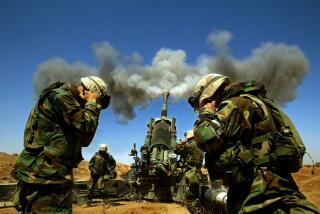Iraq Forswears Weapons of Mass Destruction
- Share via
BAGHDAD — In a late bid to undercut advocates of war against Iraq, President Saddam Hussein on Friday officially renounced the possession or development of all weapons of mass destruction.
Although immediately dismissed as too little, too late by Secretary of State Colin L. Powell and White House Press Secretary Ari Fleischer, the sweeping decree by Hussein fulfilled a long-standing demand by the U.N. Security Council. Iraq’s failure to issue it earlier had been one of the sticking points that Hussein’s critics said proved a lack of good faith and willingness over the last 12 years to comply with U.N. disarmament resolutions.
Amid an atmosphere of gathering gloom here about the inevitability of war, the country’s 250-member parliament was called into special session to endorse the decree only 2 1/2 hours before a critical Security Council meeting in New York. The parliamentary session -- taped for television broadcast -- also served as a kind of official solidarity rally, with members standing up and shouting their support for and devotion to the Iraqi leadership and decrying what they said was hypocrisy and ill will on the part of the United States.
Iraqi officials declined immediate comment Friday night after the reports by chief weapons inspectors Hans Blix and Mohamed ElBaradei and speeches by Powell and other foreign ministers at the Security Council, apparently wishing to see how the council’s debate would develop.
But in Rome, Iraq’s high-profile deputy prime minister, Tarik Aziz, reiterated his country’s willingness to work with U.N. weapons inspectors.
“We will do whatever is possible in our hands to reach the ultimate truth about the absence of weapons of mass destruction in Iraq,” Aziz told reporters after meeting with Pope John Paul II, a vocal opponent of war. Aziz added that Iraq will do “whatever is possible to cooperate with weapons inspectors.”
Aziz described U.S.-propelled scenarios about Iraqi military aggression and attacks on neighboring countries as being like a “bad American movie.”
An Iraqi source in Baghdad said the mixed grades given by Blix and ElBaradei to Iraq’s performance in disarming were received here with disappointment. The source said the two inspectors should have been “clearer” that Iraq has been working to comply with U.N. demands and that in hundreds of searches since inspectors returned to Iraq on Nov. 27, no one has found any significant banned weapons or arms programs.
“If we had them, they would have been found,” the source asserted. “What have we done -- eaten them?”
News bulletins about the Security Council meeting were followed on state television and the foreign radio stations that Iraqis widely listen to. Hearing Blix’s less-than-ringing endorsement of Iraq’s cooperation, one Iraqi car-fleet operator told an American reporter: “That’s it. The game is finished.”
Other Iraqis have begun quietly moving their families out of Baghdad, and observers have reported seeing new defense activities, such as military vehicles on the roads and freshly dug bunkers.
A spokesman for the U.N. inspectors in Baghdad, Hiro Ueki, said in a telephone interview that the number of monitors in Iraq has dropped to about 90 from a high of 110. He would not confirm that the number had fallen because of the rising threat of a conflict but acknowledged that some inspectors might have made a “personal decision” to leave at the expiration of their three-month contracts.
Meanwhile, the work of the inspectors has gone on. They tried to hold a private interview with a “senior scientist” Thursday night but failed when the scientist refused to accept the inspectors’ ground rules, Ueki said. Another team evaluated the destruction of mustard gas from artillery shells and containers, and biological weapons teams visited four sites whose existence had recently been declared by Iraq, he said.
The enactment of the presidential decree on weapons of mass destruction was Iraq’s third attempt this month to deflect criticism by meeting key U.N. demands. In recent days, Iraqi authorities also have authorized overflights by U.S.-piloted U-2 spy planes to assist the inspectors’ mission and have begun to allow scientists to be interviewed privately by inspectors without “minders” or other Iraqi witnesses present.
The decree bans production or importation of chemical, biological and nuclear weapons and of all materials to make them, and orders every government body to “take whatever measures necessary to punish people who do not adhere to it.”
According to the official Iraqi news agency, the decree came after a meeting of Hussein and his top lieutenants -- including the president’s cousin Ali Hasan Majid; Vice President Taha Yassin Ramadan; and Izzat Ibrahim, vice chairman of Iraq’s top executive body, the Revolutionary Command Council. They were quoted as saying that Iraq has no banned weapons.
“If the aggressors still attack, the blame should fall on them before God and the people,” the leaders said. “Iraqis will fight them as a people and as an armed force.”
The parliament session was called at the request of the president to counter what lawmakers said was a “mass media campaign” in the West against Iraq.
“We are ready to die for the sake of Iraq,” said parliament member Mohammed Hanoush, one of about 20 lawmakers to take the floor. “We will never surrender, and God will be with us.”
“This campaign is not to search for weapons of mass destruction,” said another member, Abdou Razak. “Rather, it is to loot our natural resources -- our oil.”
A unanimous resolution called for Arabs and “all honorable people in the world” to condemn U.S. and British actions in protests scheduled around the world today. In Iraq, the demonstrations are to be held under the slogan “Let us fight the enemy and be victorious.”
*
Times staff writer Tracy Wilkinson in Rome contributed to this report.
More to Read
Sign up for Essential California
The most important California stories and recommendations in your inbox every morning.
You may occasionally receive promotional content from the Los Angeles Times.













